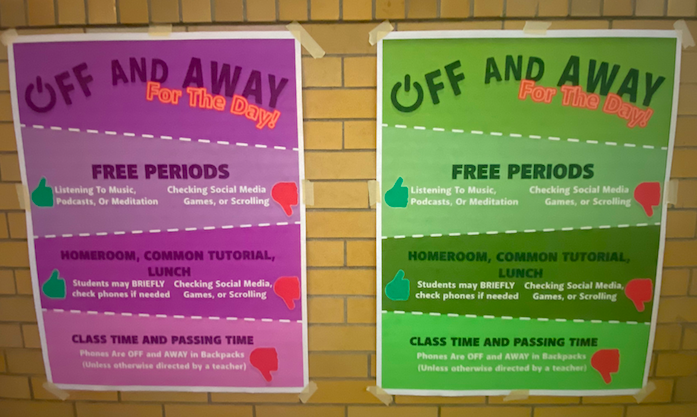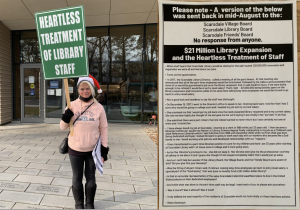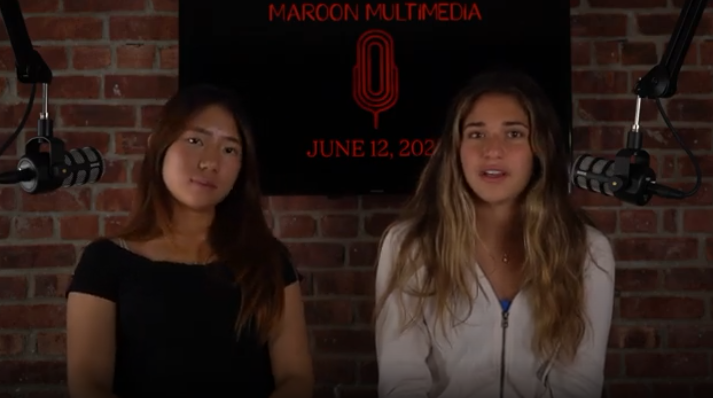Scarsdale’s Solution to Phone Addiction: The “Off and Away” Policy
Posters made by the Digital Design and Motion Graphics Club to promote and inform students about “Off and Away Day.”
January 30, 2023
“I want Scarsdale to be a leader in limiting phone usage,” SHS English teacher Jennifer Rosenzweig said. Rosenzweig has been one of the main proponents of the “Off and Away” policy that seeks to limit how often students are using their phones during school hours.
The idea for the policy began within the English department. “Maybe five years ago we noticed as English teachers that our students were having much more trouble reading long texts, reading complicated texts, focusing… and it just seemed to us that it was probably all of the technology that they were consuming that was making the difference,” said Rosenzweig. The department spent a substantial amount of time researching how phone usage affects students and the world in general. Later on, they presented to the faculty that there is a strong correlation between excessive screen time and distraction in students. Rosenzweig noted that the faculty was “blown away” by the presentation. “A lot of [the teachers were] like thank you for sharing this, [I see this] with my own children… in my house,” said Rosenzweig. She said she believes that it is the teachers’ “responsibility to help [students concentrate].”
In addition to a “drop off” in concentration ability, during their research, the English department discovered that extensive phone usage causes increased levels of mental health issues. “[The increased use of phones is] bad for your brain development and also for your self-esteem… Everything is up; anxiety depression and suicide, it’s off the charts,” Rosenzweig said. Rosenzweig also explained that sleep habits are also being damaged because students cannot get off their phones at night. Finally, the department learned that once someone uses their phone, it takes about twenty-three minutes to get back to deep concentration.
Rosenzweig has been an English teacher since before phones were invented, and she stated that she gives significantly less work than she gave before phones were popular. “I probably give a third of the reading that I gave ten years ago… My students were taking a quiz on To Kill a Mockingbird the other day… I said, ‘This is a quiz on two chapters that would’ve been a quiz probably on [ten] chapters [years ago],’” Rosenzweig added. She gives less reading due to the large amount of time that students take to complete the reading due to their phones. “If you think about your own life, how much of your time is filled up… with these notifications? And it’s coming from every direction; it’s notifications for school, from your parents, from your friends, from social media, from the news,” Rosenzweig explained.
Rosenzweig knows that this addiction is not the students’ fault. She believes that Generation Z was simply “born into a time where everybody is attached to their device every second of their lives.” It is the only reality that students have ever known.
However, what can teachers do to fix the problem? “We have seven hours of the day, 8AM to 3PM, five days a week, for ten months of the year. We could make this look different,” Rosenzweig said. She would like the school to look like a much calmer place of deep learning and concentration. This way, students can build better habits so that when they leave high school, they can be most successful. Rosenzweig will be leading in the hosting of an ‘Off and Away’ Day on January 30. “[There will be] music in the hallways in passing time. I’m hoping to get a bunch of snacks in the hallways, games in the cafeteria [and] in the Learning Commons… The Graphic Design Club has made posters so we’re gonna try to plaster the posters to remind [students to keep their phones away],” Rosenzweig said. Students will be encouraged to not bring their phones to school. If it is absolutely necessary to bring it, (for communication or transportation purposes), they should put it in their backpacks.
In conclusion, Rosenzweig thinks that “[school] would be a very… normal place to start limiting phone usage…” Since society has become so invested in using phones, it would be impossible to ban them completely. However, being more mindful of phone usage could massively improve the well-being of students. Whether Rosenzweig has the support of the whole community or of nobody, she “will not give up the fight because it’s too important.”

























Aaron • Jan 29, 2023 at 11:12 pm
10/10
Ava Schnipper • Jan 29, 2023 at 11:16 pm
Thank you